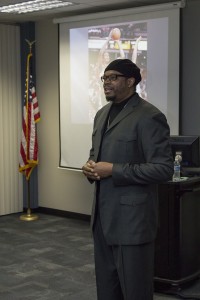
Photo by: Bogdan Sierra Miranda/The Collegian
By Martin Paredes/south news editor
As part of South Campus’ Black History Month arts and athletics week, former professional athletes Dexter Coakley and Sam Perkins stressed to students that many things can be taken from them, but their education could not.
Coakley, a former Dallas Cowboy, praised students at the Feb. 11 event for pursuing higher learning.
“First of all, I commend you all for being here,” he said. “It doesn’t matter where or how you start. It’s all about how you finish.”
Coakley’s father dropped out of school to provide for his family, and his mother had only a high school education.
“They gave me everything they could give me, but education wasn’t something they could do because they didn’t have it themselves,” Coakley said. “They still always preached education more than anything.”
Coakley referred to athletics as the “cherry on top of the cake” as it came second to education. In eighth grade, he expressed his desire to play organized football. However, Coakley didn’t necessarily get his father’s vote of confidence.
“What kinds of grades are you making? Are you passing in school?” his father asked. “Are you excelling in that area because I could care less about you playing football.”
Coakley also admitted to not giving college much thought because it was foreign to his family.
“No one went to college. No one,” he said. “So college wasn’t even spoken in my household. It was something that I knew nothing of.”
Coakley was not eligible to play football at a four-year college because of his SAT scores. Luckily, his parents suggested he go to Fork Union Military Academy in Virginia for a year to get the grades necessary to transfer to a bigger university. The only problem was finding the money to pay for the tuition.
“Where are my parents going to get $10,000 to send me to a military academy?” he asked.
Through the aid of family members and neighbors, Coakley paid for the military academy. He credited those who helped him succeed.
“My story is not about me,” he said. “My story is about a lot of people helping me to achieve the things I wanted to achieve, to meet the goals I wanted to meet.”
After a year at Fork Union, Coakley transferred to Appalachian State University and chose to take summer classes instead of returning home and risking being tempted by his former “homeboys” who did not have his best interest.
“I heard it all,” he said, “but it didn’t bother me because I knew at the end it would all work out.”
Coakley learned that to be successful, he had to surround himself with like-minded people trying to better themselves.
“Sometimes, it’s going to be hard to say no,” he said. “But think of all the people that helped you get to this point. You can’t disappoint them.”
Though Coakley was a 10-year NFL pro, he was still grateful for his education.
“In football, you’re one play away from being done,” he said. “But your education, they won’t ever take that away from you.”
Perkins, a former Dallas Maverick, knows making it in any career is a difficult task.
“There are so many people trying to do the same thing you do, so you are going to have to have a backup plan,” he said.
Growing up in Brooklyn was not easy, Perkins said.
“Everybody says stay in school, but I was just trying to get to school,” he said. “Coming out of Brooklyn, there were so many things that could deter you from going to school.”
And even at school, Perkins would deal with a lot.
“Gang members used to come into your class and just taunt the teacher,” he said. “And for some reason, they would pick on me because I was the tallest cat in there.”
Perkins soon transferred to a better school that was recognized for education.
This change was intimidating for Perkins, especially when his stepfather told him, “You won’t be able to play ball unless you maintain a B or better.” Perkins answered his stepfather’s challenge and was soon being recruited by some of college basketball’s most successful coaches.
“I had a lot of coaches come through my home, and they all talked about basketball. They all talked about starting on the team getting a job,” he said, including those from Notre Dame, Syracuse and Kansas.
When coach Dean Smith of North Carolina, who passed away Feb. 7, visited Perkins’ family, he came in with a different approach.
“He talked about education more so than any other coach that came in there,” Perkins said. “‘If you want to be the first in your family to get a degree, you can do that. And while you’re there, you can play basketball too.’”
Smith’s message won over Perkins and his family.
“These guys came in with the attitude of playing basketball, but Coach Smith made me feel so comfortable along with my parents, stepfather and all,” he said. “They were in agreement with me that this is where I should go.”
Perkins now mentors players who make the jump from college to the NBA.
“I’m one of those personnel along with some other former players that try to get them fixed with their new lifestyle because some of them don’t have any idea what they’re supposed to do when they get there,” he said.
South student Alvin Taye enjoyed hearing from the two.
“I always like hearing what former professional athletes have to say,” he said.






















